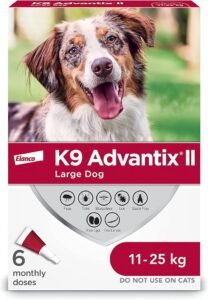Dog owners are learning that the gut is an active immune organ and a key player in behavior and overall well-being.
The community of microorganisms inside a dog’s intestines, known as the gut microbiome, acts as a living ecosystem that helps process nutrients, regulate inflammation, and defend against pathogens. When this balance, called eubiosis, is maintained, the result is better digestion, a stronger immune response, and often, calmer and more focused behavior.
The Immune System Lives in the Gut
It’s estimated that a large portion of a dog’s immune function resides in the gut-associated lymphoid tissue (GALT), a dense network of immune cells lining the intestines. A balanced microbiome supports these defenses by helping the body recognize harmful invaders while tolerating beneficial microbes and food proteins.
Research shows that maintaining microbial balance reduces inflammatory responses and strengthens the gut barrier, preventing “leaky gut” and secondary skin or allergy flare-ups [¹]. When beneficial bacteria thrive, they produce short-chain fatty acids (SCFAs) that nourish intestinal cells, modulate immune signaling, and even influence neurotransmitters like serotonin, often called the “feel-good” chemical, which is largely produced in the gut [²].
When the Balance Breaks
Antibiotic use, stress, poor diet, or abrupt dietary changes can disrupt this microbial harmony, leading to diarrhea, itching, or recurrent infections. Behaviorists sometimes observe the effects first: nervous energy, loss of focus, or even reactivity in dogs that previously trained well.
“When we see a dog struggling with unpredictable behavior, one of the first questions we ask isn’t about training; it’s about diet and digestion,” says Elliot Rosenberg, master behaviorist at K9 Mania Dog Trainer Academy. “A healthy gut produces calmer, more balanced dogs who can actually learn.”
This gut-behavior connection is the gut-brain axis, an emerging field in veterinary research, showing that intestinal microbes can influence mood and stress responses in both humans and animals.
How Probiotics Help
Probiotics, which are live beneficial microorganisms, help restore or maintain healthy gut flora after disruptions. In dogs, strains such as Lactobacillus acidophilus, Bifidobacterium animalis, and Enterococcus faecium are the most studied and widely used.
Each strain plays a distinct role:
- Lactobacillus species lower intestinal pH, suppressing harmful bacteria.
- Bifidobacterium improves stool quality and produces SCFAs that support intestinal cells.
- Enterococcus faecium assists in immune modulation and enhances antibody production.
In a 2025 review, researchers found that probiotics helped regulate canine gut homeostasis, reducing diarrhea incidence and boosting immune markers such as secretory IgA.[³] Another study on aged dogs reported that a multi-strain probiotic significantly increased beneficial gut bacteria and improved immune responses.[⁴]
Not all probiotics are equal, however. Look for veterinary-formulated products that clearly list bacterial strains, specify CFU counts, and include storage guidelines to ensure live bacteria reach your dog’s intestines intact.
Supporting the Microbiome Beyond Supplements
Diet remains the foundation of gut health. Prebiotic fibers like inulin and fructooligosaccharides (FOS) feed beneficial bacteria, allowing probiotics to thrive. Balanced, high-quality diets rich in natural fiber and moderate fat help maintain healthy fermentation in the colon.
Exercise also contributes by promoting regular digestion and lowering stress hormones that can disrupt gut bacteria. Dogs under chronic stress due to unpredictable environments, harsh training, or insufficient enrichment often experience shifts in gut composition. Consistent routines and positive reinforcement training support both emotional stability and microbial balance.
“When we train a dog, we’re not just shaping behavior, we’re supporting the whole animal,” Rosenberg adds. “Gut health is the unseen foundation for emotional and physical balance.”
Supporting Your Dog from the Inside Out
Gut health is the biological foundation for immunity, mood, and longevity. By prioritizing microbiome care through balanced nutrition, appropriate probiotic use, and stress-free living, dog owners can enhance their companions’ resilience from the inside out.
A well-nourished gut doesn’t just produce a healthier body. It produces a happier, more confident dog.
References
- Teng, Q. et al. (2025). “Gut Probiotics and Health of Dogs and Cats: Benefits, Applications.” Frontiers in Veterinary Science. https://pmc.ncbi.nlm.nih.gov/articles/PMC10609632
- Wang, T. et al. (2025). “The Function of Probiotics and Prebiotics on Canine Intestinal Health.” Animals 15(2): 343. https://pmc.ncbi.nlm.nih.gov/articles/PMC11205510/
- Hernández, M. et al. (2024). “Influence of Probiotic Administration in Canine Feed.” Frontiers in Microbiology. https://pmc.ncbi.nlm.nih.gov/articles/PMC12115967
- Chen, Y. et al. (2019). “Oral Administration of Compound Probiotics Improved Immune Function in Dogs.” BMC Veterinary Research. https://pmc.ncbi.nlm.nih.gov/articles/PMC6454072











